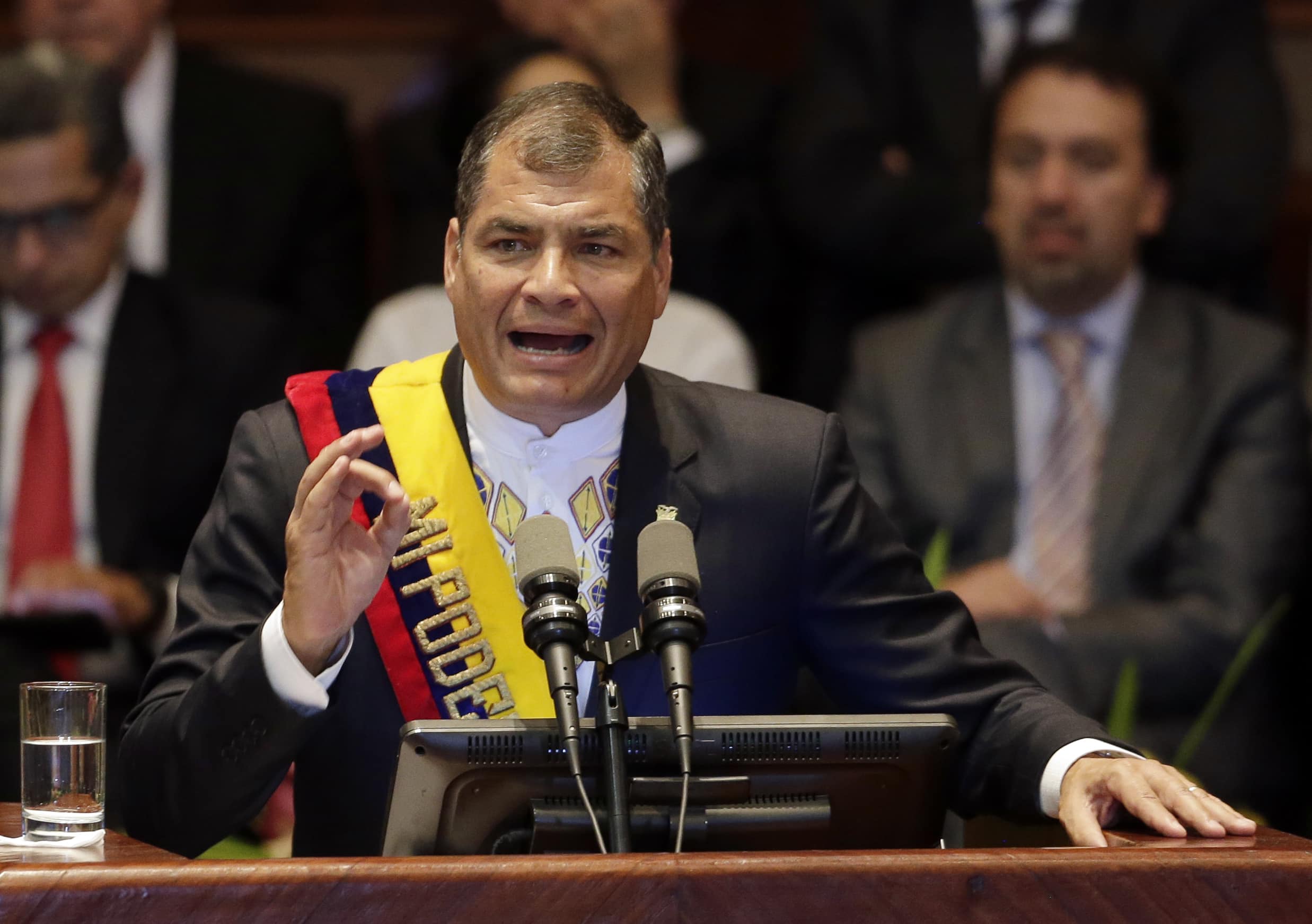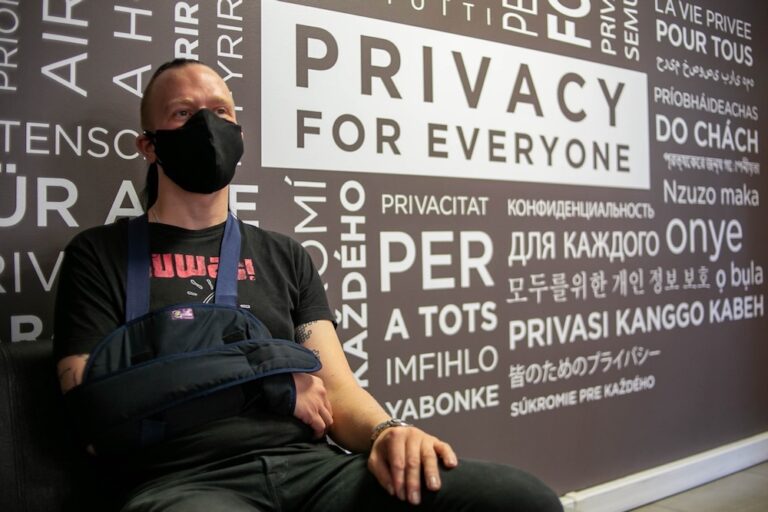People facing jail terms in Ecuador for participating in anti-government protests can appeal under a new law, but the courts have repeatedly stalled on hearing their cases. The convictions are based on overly broad definitions of crimes that are no longer applicable.
This statement was originally published on hrw.org on 21 July 2015.
People facing jail terms in Ecuador for participating in anti-government protests can appeal under a new law, but the courts have repeatedly stalled on hearing their cases, Human Rights Watch said today. The convictions are based on overly broad definitions of crimes that are no longer applicable to these cases, but courts have delayed scheduling appeals in cases in which top officials had expressed approval for the original sentences.
In recent years, prosecutors and judges in Ecuador have used charges of “terrorism” and “sabotage” in the criminal code against anti-government protesters. Human Rights Watch has documented several of these cases. However, the new criminal code that entered into force in August 2014 narrowed the vague and overly broad definitions of both offenses. Rather than acting promptly to review the unjust convictions based on the new provisions, judges have failed to even set hearing dates for appeals in cases in which President Rafael Correa and other government officials had signaled their satisfaction with the convictions.
“There is no question that if someone commits a crime during a protest, he or she should be investigated,” said José Miguel Vivanco, Americas director at Human Rights Watch. “But it’s deplorable not to grant hearings to set aside terrorism or sabotage convictions for peaceful protesters and government critics even when Ecuadorian law has changed to avoid this kind of abuse of the justice system.”
The new code states that judges should “apply the most favorable law,” even if there is no explicit request by an interested party and even if a different law was in force when the convictions were handed down.
Although there is no single definition of terrorism in international law, standards provide that the term should only be used for the gravest crimes of political violence. The United Nations General Assembly has urged states to “ensure that their laws criminalizing acts of terrorism are accessible, formulated with precision, non-discriminatory, non-retroactive, and in accordance with international law, including human rights law.”
The broad definitions of “terrorism” and “sabotage” included in Ecuador’s criminal code until August 2014 did not meet the internationally recognized principle of legality, which requires that crimes must be precisely defined in law, Human Rights Watch said.
Terrorism included “crimes against the common security of people or human groups of whatever kind or against their property,” committed by individuals or associations “whether armed or not” with “social, economic, political, religious, [or] revolutionary” purposes, among others. The definition also included “etc.” five times, leaving an open-ended array of unspecified actions that could constitute terrorism.
The sabotage provision criminalized:
[W]hoever destroys, damages, renders useless, or paralyzes public services, industrial or manufacturing installations, shopping centers, ports, channels… vehicles or any other kind of means of transportation, public or private installations of electric energy, potable water, gas or other similar, or radio, telephone, telegraph, television or any other system of transmission; warehouse containing goods, explosives, lubricant, fuel… or any other similar type of warehouse, with the purpose of causing collective alarm.
In one case that Human Rights Watch documented, 10 people were sentenced to a year in prison for attempted terrorism for participating in a peaceful meeting to plan a protest. In another, a university student was sentenced to four years for sabotage for entering the building hosting the public TV channel to demand an opportunity to speak to the public at a time when all other stations were forced to transmit the public TV channel’s programming. And a teacher was sentenced to eight years for sabotage for allegedly inciting students to participate in an anti-government protest while a police mutiny was taking place.
Government officials, including Correa, made public statements supporting these prosecutions, which occurred under the old law. A July 2014 report by three foreign nongovernmental organizations – the Due Process of Law Foundation, Dejusticia, and the Institute for Legal Defense – documented routine executive interference with judicial decisions, misuse of the penal system to target people who question the government’s policies, and misuse of the judiciary’s internal disciplinary system to sanction judges whose rulings were inconsistent with the Correa administration’s policies.
The new Organic Integral Penal Code that entered into force in August 2014 provided much more detailed definitions of “terrorism” and “sabotage.”
In the new code, “terrorism” is defined as an act by a “person who individually or forming armed associations provokes or maintains the population or a part of it in a state of terror, through acts that put in danger the life, physical integrity or liberty of people, or endanger buildings, media outlets, transportation, using medium capable of causing damage.” The new code increased the penalties for terrorism from a range of 4-to-8 years to 10-to-13 years, and from 16-to-25 years to 22-to-26 years when the terrorist acts cause someone’s death.
Sabotage is defined in the new code as actions such as “destroy[ing] industrial or manufacturing installations, shopping centers, ports, channels… vehicles or any other kind of means of transportation [or] goods that are essential for public or private services,” committed “with the purpose of disrupting the economic situation or public order.” Penalties were decreased from 8-to-12 years to 5-to-7 years. While the previous code provided for an aggravated penalty of 16-to-25 years if someone was killed, the current code only includes an aggravated penalty of 7-to-10 years if infrastructure of strategic sectors is destroyed.
During its research, Human Rights Watch found a consensus among Ecuadorian jurists – including Mauro Andino, president of the National Assembly’s Justice Commission, who was involved in drafting the new code – that the new provisions should be applied retroactively to those already convicted of acts that no longer constitute terrorism or sabotage under the new definitions. Andino did not comment on specific cases.
Ecuadorian jurists interviewed by Human Rights Watch said the requirement in the new code to “apply the most favorable law” imposes an obligation on prosecutors to drop charges in ongoing prosecutions when the offending behavior falls outside the new definitions, as they no longer have a basis in law, and on judges to reverse convictions in cases where the offending behavior is no longer criminalized, when they come for appeal.
If a case is still on appeal, judges should apply the most favorable norm when reviewing the appeal, whether or not interested parties ask them to do so. If a conviction is finalized, Ecuadorian law applicable to cases that started before August 2014 provides for a specific recourse, called “revision,” under which interested parties can apply to the National Court of Justice to vacate a conviction if a more benign law is subsequently adopted.
The American Convention on Human Rights states that “[i]f subsequent to the commission of the offense the law provides for the imposition of a lighter punishment, the guilty person shall benefit therefrom.” The Inter-American Court on Human Rights has noted that this provision should be interpreted as encompassing norms “that decriminalize a behavior that was previously considered an offense” and it should be applicable “before the judgment was delivered and during its execution.”
As of February 2015, 1,757 people had been released as a consequence of these provisions, Correa has said, although he has not provided detailed information about whether charges had been dropped or convictions had been overturned. However, in the cases documented by Human Rights Watch, although the defendants appealed their cases, the courts have not set hearing dates for many months, well in excess of the time frames set out in law, thereby denying the defendants the opportunity to have their convictions reconsidered and set aside under the new law.
Human Rights Watch believes, based on interviews with victims, their lawyers, and jurists, that the delays in hearing the cases are largely the result of political pressure. That is especially likely to be true in cases in which the president and other government officials endorsed the convictions when they were originally handed down. Human Rights Watch conducted research missions to Ecuador in October 2014 and March 2015, and has also reviewed official documentation in all cases – including official summaries of judicial hearings, testimonies, and judicial rulings.
“These groundless terrorism and sabotage convictions exemplify the government’s use of repressive legislation against its critics,” Vivanco said. “These charges should never have been brought, and there is no legal justification for failing to grant the defendants hearing dates so these unjust convictions can be overturned.”



